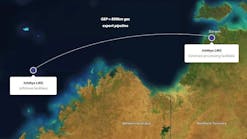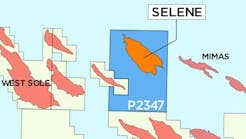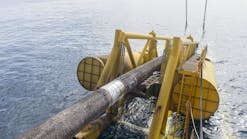Jeremy Beckman
Editor, Europe
Consignments of pipe for the Europipe trunkline, a project which was to prove the undoing of certain Statoil/Mannesmann individuals.
Europe's oil companies have been working with the police to try to stem the rise in illegal information brokering. Investigators in Norway claim that all key North Sea purchasing is now subject to infiltration from brokers.
A list of 50 suspect individuals has been drawn up. Catching them, however, is proving problematic due to vagaries in defining fraud in the UK, and a European law which blocks such blacklists. Norway, which is outside the European Union, has had more success than most with prosecutions.
David Motherwell, a senior internal auditor at BP, claims that any oil and gas projects valued at over $20 million are likely targets. Due to the increasing globalization of fraud networks in the industry, BP has pooled its findings with the Information Coordination Group, a unit of the Exploration and Production Forum headed by Exxon (the other members are Mobil, Shell, and Statoil). Their shared database includes details of the 50 individuals identified in Europe. Nearly all are male and over 40, with many years' experience in the oil and gas sector. The solitary woman is the wife of a deceased information broker.
Last month, the five oil majors were expected to prolong their cooperation agreement, as they try to develop best practice for combating information brokering. Investigations have not yet extended beyond Europe, but Motherwell sees the Far East as a fertile breeding ground. "And Houston must have its own information brokers."
Szrajber factor
Motherwell was speaking at a recent IIR-organized conference in London on oil and gas industry fraud. BP's own known worst experiences derive from two individuals who were exposed and subsequently jailed. Jozef Szrajber was first identified as selling confidential BP information in 1984. Five years later, a supplier informed BP that Szrajber had approached them for the same purpose. The details were passed to London City's Serious Fraud Office, but lack of firm evidence led to the case being dropped.However, the following year Szrajber was nailed for attempting to bribe an Esso employee at the Fawley refinery in southern England. The employee reported the overtures, but agreed to go through with a meeting with Szrajber at a London hotel, wired to a tape recorder. He was offered inducements such as a Swiss bank account and a company pension.
Later in the year, Szrajber was arrested, with the police seizing his documents: these included hand-written notes in exercise books on oil industry contacts that might furnish information. The Fraud Office was surprised at the amount of information relating to BP. Following investigations in offices in the UK and Norway, it emerged that Szrajber had employed an Italian engineering parts trader, Paolo Sorelli, as his agent.
In 1993, BP staff gave evidence against this duo, who were then handed three-year sentences by the UK courts. They actually served 15 months in an open prison and were continuing their business there with mobile phones. "It is really difficult to take action against these fraudsters," Motherwell said.
Information brokers in Britain benefit from the fact that there is no defined offense for fraud - only conspiracy to defraud - and also from the unwillingness of bankers to divulge confidential data. Motherwell added that in some countries such as Japan, it is not illegal to bribe staff to purchase confidential information: in Germany, the bribe is even tax-deductible (so long as the employee is not working for a German company).
Knowledge can also be acquired for free through casual conversations in conferences, hotel bars or on a plane. Whatever the method, the total cost of procurement fraud to the oil industry appears to be 3.5% of all Capex projects, Motherwell claimed.
The Szrajber case revealed that five suppliers were involved in four BP North Sea contracts, with bribes totaling $30 million for just 10 orders. "We believe that to be the tip of the iceberg for BP over the past 25 years," said Motherwell, "and I'd be surprised if it wasn't the same for the other majors."
BP has instituted staff awareness programs that include tips on how to recognize an information broker and what to do when approached. In some cases, said Motherwell, the broker is after really fine detail down to the name of the target's dog, just to get a hold on an individual in the procurement department. BP recommends staff in turn to try to get as much information as possible on the broker such as phone and fax numbers, and then report it.
Symptoms
Fraudsters in the oil sector, like elsewhere, are often individuals de-motivated by lack of progression up the corporate ladder, while senior executives appear to be living it up. However, there are certain pressures unique to the industry, according to Martyn Jones, a national audit technical partner at Deloitte Touche. The need to achieve results in exploration can lead to misrepresentation of geological data, especially with the threat of your own service being outsourced.Jones also warned of the dangers inherent in working in the new oil and gas regions, where there is exposure to different cultural traditions. A Russian official stated recently that the country's Mafia was waging open war on the energy industry. There had been "a lot of disclosures in India recently," Jones claimed, and forgeries of transhipment documents elsewhere. Typically, an apparently wrecked tanker has its crude picked up by another tanker that "happens to be in the vicinity", or else rust buckets are represented to charterers on the other side of the world as fine ships.
Allan McDonough of Network Security Management countered that there was an arrogant tendency in the oil and gas industry to label countries such as Malaysia and the Philippines as corrupt, while the accusers themselves often concluded deals in their own gentlemen's clubs.
Nigel Iyer, another Network Security Management consultant, formerly with Norsk Hydro in Bergen, said that recent offshore industry trends such as outsourcing, partner agreements, subcontractor and frame agreements were all open to misuse. Signs of an impending fraud were excessive rush orders for platform equipment, or mysterious bid waivers - relatively easy to push through, he said, since people along the purchasing chain will often passively sign a document because the person listed above their name signed it.
Suppliers that are known to be unscrupulous - perhaps supplying rusty drillpipe from another part of the world - can cover their tracks by forming companies in different names that somehow make it onto the official oil company suppliers' list. However, these fraudsters are often too mean to invest in different fax machines, said Iyer: suspicions can be confirmed through careful scrutiny of a supplier database.
Most delegates at the conference complained of the barriers to getting senior management involved in their fraud investigations. Iyer offered a solution: "Show your manager on your computer how you can access terminals via the network on your platforms anywhere in the world."
Europipe incident
Norway's first reported case of attempted information brokering was Statoil's Veslefrikk project in 1988. The ensuing bribery charges in the 1991 Europipe project led Stavanger police to form a corruption squad dedicated to the activities of the oil industry. It emerged that individuals at steel pipe supplier Mannesmann had paid a Statoil employee millions of kroner to place a contract their way.Investigations by the squad led to the arrest in August 1992 of one Statoil and two Mannesmann employees, not for the Europipe incident, but for inducements relating to different contracts. A Mannesmann sales manager was also arrested in Dusseldorf. Prosecution of this case still continues.
The four officers in the corruption squad have collaborated with Norway's own Fraud Office, with law enforcement agencies elsewhere in Europe (particularly Switzerland and Britain's Channel Islands), and with the five oil companies in the Information Coordination Group. Intelligence collected is not confined to events in Norway, and data is often passed on to the oil companies, said Tore Soldal, the squad's assistant chief of police.
In its first year of operations, the squad encountered problems. "We didn't trust the oil business and vice versa," Soldal said. "We each worked with our own methods - there was not much cooperation. However, neither of us had much success, so after a year we agreed to work closer, to get to know each other.
"I think oil companies could find enough evidence to fire corrupt employees, but only the threat of prison would really prevent corruption."
Soldal claimed oil companies had misgivings about handing control of a fraud case to the police: corporate reputations are at stake when health and safety are affected. One persistent offender, a Norwegian consultancy named Idavoll, had secured work on Veslefrikk, Zeepipe and Europipe. It came to light that Idavoll employees, acting as quality inspectors, were turning a blind eye to the sub-standard work of certain contract staff.
The case involved inducements to Statoil engineers in the form of monies paid to bank accounts in Britain. Arrests were made, but the accused denied doing anything to impact safety or the environment in the North Sea. When the Idavoll owner was released from custody, he sold his consultancy.
There is no regular jury in Norwegian fraud cases, merely a judge and two civilians: in the Mannesmann case, two professors from a technical university. Due to the mounting costs of oil industry investigations, the Stavanger Serious Fraud Office is assuming control from the corruption squad.
Sordal claimed information brokers are trying to infiltrate all main North Sea contracts, "and we have documents that prove this...however, in Norway it isn't a crime to pay kickbacks for contracts".'
Mobil team intrigued by students
Mobil has scaled down its worldwide complement of in-house security personnel to 27, and is even considering outsourcing. Currently, three security advisers are retained in the UK, reporting to Fairfax, responsible for monitoring Europe, Africa and the Middle East. Their remit covers the physical side of security, such as closed circuit TV, but also risk assessment.The newest of the UK trio is Steve McCusker, ex-Britain's Central Intelligence Department. He told the London conference he was trying to create conditions for Mobil staff to report a crime internally. "I went to Mobil's operation in Aberdeen recently, and found that no one had heard of me or our security investigations unit."
But McCusker's influence is extending. "Mobil want me to sit in on bids," he said. "If security can get into pre-bid scenarios, that can only be of benefit to organizations."
Nigeria, surprisingly, is where McCusker travels most. On one of his latest trips to Lagos, he and his colleagues obstructed payment of a false $850,000 claim submitted by a contractor to Mobil's Dallas office. Payment almost went through unchallenged: an employee happened to notice a discrepancy in the documents.
McCusker was suspicious of a Nigerian government ruling that obliges foreign companies to employ its students: they are even allowed to stay in the companies' offices after all other staff have gone home.
The claimant had requested the check to be paid into a Swiss bank account (on reception, it transpired, the money would have been switched immediately to another bank in Germany). McCusker and his team set a trap, sending a message to the claimant that the check would have to be collected in person from a mail room in Lagos. McCusker waited there in vain for two weeks: just as he was about to give up, it was collected - by students.
"The moral of this story," he said, "is never give up. These people, incidentally, have not been charged."
Copyright 1997 Offshore. All Rights Reserved.






